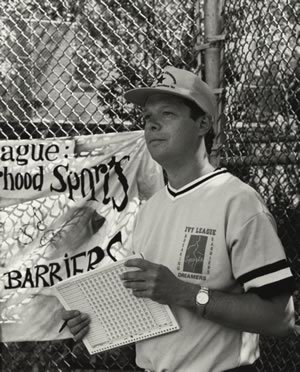Al Kurland
In the ethnically diverse New York City neighborhood of Washington Heights, Al Kurland fosters leadership and confidence through the old-fashioned tools of athletics and community service. As “godfather” to over 1,000 young people, Al is adept at harnessing community resources to create comprehensive programs for the entire neighborhood. For the past 15 years, Al has designed and directed a range of after-school and athletic programs for the youth of Washington Heights in order to encourage them to work hard, play well, and develop a high level of respect for and commitment to their community.
Al was born to a Jewish mother who escaped from France during World War II and a Russian father. Al remembers the Kurland family ethic as a constant as he grew up in Queens with his two sisters and brother. “Our parents imbued us with a sense of social consciousness. They were very opinionated about economic justice and civil rights,” he says. “As kids, we were exposed to civil rights work. We boycotted schools during the desegregation movement, and were also involved in the anti-war movement.”
Al’s work with young people began in 1972 in Rego Park, Queens, at the Life Skills School, which specializes in the education and support of students with severe mental and emotional challenges. He spent 20 years there, first as a young work/study aide, then as a teacher, and finally as a supervisor. “Life Skills was as much a family and home as it was a place of employment. We all grew up together.” While at Life Skills, Al volunteered at the 280 Dreamers Program, a youth program in Washington Heights that emphasized volunteerism, self-help, entrepreneurship, and collaboration in sports, camping and community service. In 1994, he was offered a job there to create an after-school program. He designed an eclectic program that has built a network of young people who are involved in many creative outlets. Al explains, “our mentality at the 280 Dreamers is that today’s youth need to learn how to help themselves and their friends.”
When he recognized that the absence of school sports programs for young girls affected their self-esteem, Al created the all female Ivy League: UPTOWN WINS (Uptown Women in Neighborhood Sports.) The Ivy League offers competitive softball and track to 200 girls, ranging from sixth grade through high school. “We see the transition in these girls,” Al explains with pride. “Some of them turn into athletes. Others change their attitudes and tend to be less critical of themselves and their peers. Overall, the girls are more confident because of their involvement in team sports.” One of his softball players, Erica Martinez, reflects on her participation in his girls’ athletic program: “I’m now able to speak my mind and also have people listen and hear what I have to say. Since I’ve been in softball, I’ve learned how I could help the needy and it was fun.” Jackie Joyner-Kerse, Olympic track and field champion, and Alice Coachman, the first black woman to win an Olympic medal, gave a running workshop for the Ivy League girls.
Al has been appointed to create and direct a new after-school center for the Police Athletic League (PAL) in Washington Heights, one of twelve youth centers in Manhattan, Queens, Brooklyn, the Bronx, and Staten Island. Al envisions that the new center will draw on the resources of the neighborhood, providing classrooms, a game room, and a gymnasium. Numerous agencies including Sheltering Arms (computer training for single mothers), Armory Center Track and Field, a citizenship center, and Teach for America will deliver a wide variety of social services, including day care.
Al’s tireless commitment to the children of Washington Heights has been influenced by a number of personal losses. He has lost numerous friends to senseless murders, his brother-in-law died from leukemia, another friend was killed by a student he was trying to help with drug addiction, and a close cousin died from AIDS. Most recently, he lost a neighborhood child to police violence. “The young people I know who have died have had so much potential and so much talent to give to the world.” In the face of these losses, Al is marshaling a small army of dedicated, young activists. “When you’re working in the trenches together, you naturally help each other out, sharing resources and personnel and giving advice and encouragement.”
Al Kurland considers the opportunity to work side-by-side with young people, exposing them to new opportunities, giving them responsibility and watching them grow, to be a gift. “They are truly mentors and leaders to one another and I’m constantly learning from them about other possibilities of what can be.”
 Photo by Dorothea von Haeften
Photo by Dorothea von Haeften